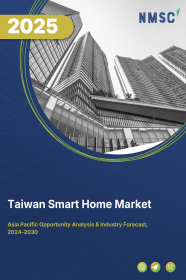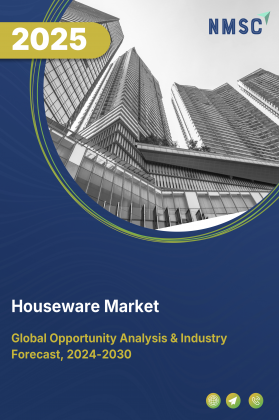
Taiwan Smart Home Market by Product Type (Smart Lighting, Smart Home Security and Surveillance, and Others), by Communication Protocol (Wifi, Zigbee, and Others), by Smart Home Hubs (Standalone Hubs, and Built-in Hubs), by Voice Assistants Integration (Amazon Alexa, and Others), by Smart Home Compatibility with Smartphones (iOS, and Android), by Installation (DIY Intallation, and Others), by Sales Channel (Online, and Offline) – Opportunity Analysis and Industry Forecast, 2024–2030.
Industry: Retail and Consumer | Publish Date: 26-Aug-2025 | No of Pages: 182 | No. of Tables: 142 | No. of Figures: 87 | Format: PDF | Report Code : RC2283
Taiwan Smart Home Market Overview
The Taiwan Smart Home Market size was valued at USD 1.10 billion in 2023, and is predicted to reach USD 5.21 billion by 2030, at a CAGR of 25.0% from 2024 to 2030. A smart home, also referred to as a connected home, is a residential space equipped with cutting-edge technology and automation systems. Smart home systems allow for the centralized control and monitoring of a wide range of household devices, appliances, and security features through a unified network. These intelligent devices can be managed remotely and often respond to voice commands or pre-set schedules, providing homeowners with enhanced convenience, energy efficiency, and security. Connected homes typically incorporate components such as smart thermostats, lighting systems, security cameras, voice assistants, and other interconnected devices, all aimed at enhancing the overall living experience.
Taiwan’s Semiconductor Strength Accelerates Smart Home Market Growth
Taiwan’s leadership in semiconductor manufacturing significantly boosts the development of its smart home market. The country is a global powerhouse, producing a substantial share of the world’s semiconductor chips, including more than 60% of total output and over 90% of the most advanced chipsets. This dominance is anchored by companies like TSMC, which is central to global supply chains.
This technological edge empowers Taiwan-based companies to design and produce high-performance smart home devices, sensors, and components locally. As a result, manufacturers benefit from a reliable, advanced, and cost-effective component supply, enabling faster product development and lower prices for consumers. This synergy between the semiconductor sector and home automation industry is a major growth driver for the Taiwan smart home market.
Taiwan Government’s Smart City Initiatives Fuel Smart Home Market Expansion
Government-backed smart city initiatives in Taiwan are playing a pivotal role in accelerating the growth of the smart home market. Through strategic investments in digital infrastructure, urban connectivity, and sustainable technologies, the Taiwanese government is actively promoting the development of intelligent, livable cities. These efforts are encouraging citizens to embrace smart home solutions that align with the broader goal of creating seamless, tech-enabled urban living environments.
By fostering a strong culture of innovation and supporting the integration of IoT, AI, and automation into everyday life, these initiatives significantly boost public awareness and adoption of connected home devices. From energy-efficient systems to smart security and remote-controlled environments, the push for smarter cities directly translates into rising demand for smart home technologies across Taiwan’s urban centers.
Security and Privacy Concerns Hinder Smart Home Growth in Taiwan
Despite the market's growth, security and privacy concerns pose significant challenges for smart home adoption in Taiwan. As connected devices such as smart locks, surveillance cameras, and home assistants become more prevalent, they also become potential targets for cyber threats. Weak passwords, outdated firmware, and unsecured Wi-Fi networks can expose homeowners to unauthorized access and data breaches.
Such vulnerabilities raise concerns among consumers, impacting trust and adoption rates. Cybercriminals may exploit insecure systems to control devices or collect personal information. Addressing these issues requires stronger cybersecurity practices, such as routine firmware updates, encrypted connections, two-factor authentication, and public education on digital hygiene. Building a secure and privacy-focused ecosystem is essential for the long-term success of the Taiwan smart home market.
Blockchain Integration Offers Promising Opportunities in Taiwan Smart Home Market
The integration of blockchain technology presents a significant opportunity to enhance the security, transparency, and reliability of smart home systems in Taiwan. Blockchain’s decentralized structure and encryption capabilities enable users to maintain strict control over access permissions, device authentication, and data sharing—key concerns for connected households.
By validating the identity of each device on a smart home network, blockchain can prevent unauthorized access and ensure only trusted interactions occur. Smart contracts offer secure and automated management of device operations, enhancing efficiency while reducing vulnerabilities. As the demand for safer, more accountable smart environments grows, blockchain-enabled solutions have the potential to reshape Taiwan’s smart home landscape, offering a new frontier for innovation and consumer confidence.
Competitive Landscape
Several market players operating in the Taiwan smart home industry include Samsung Electronics Co., Ltd., Delta Electronics, Inc., Google LLC, Apple Inc., ASUSTeK Computer Inc., TP-Link Systems Inc., Xiaomi Corporation, Legrand S.A., Acer Inc. (“Acerpure”), Signify N.V. (Philips Hue), D-Link Systems, Inc., LifeSmart (Agile Tech Co., Ltd.), TGM Technology Co., Ltd. (TGMTEK), Bosch Taiwan Co., Ltd., and IKEA Taiwan (Ingka Group)
Taiwan Smart Home Market Key Segments
By Product Type
-
Smart Lighting
-
Smart Bulbs
-
Smart Light Strips
-
Smart Switches
-
-
Smart Home Security and Surveillance
-
Smart Cameras
-
Video Doorbells
-
Smart Locks
-
Security System
-
Smart Entertainment
-
Smart TVs
-
Smart Speakers
-
Streaming Devices
-
-
Smart Appliances
-
Smart Refrigerators
-
Smart Ovens
-
Smart Washing Machines
-
Smart Dishwashers
-
Smart Home HVAC Management
-
Smart Rice Cooker
-
Smart Pantry/Storage System
-
Smart Blender
-
Other Smart Appliances
-
By Communication Protocol
-
Wi-Fi
-
Zigbee
-
Z-wave
-
Bluetooth
-
Thread
By Smart Home Hubs
-
Standalone Hubs
-
Built-in Hubs
By Voice Assistants Integration
-
Amazon Alexa
-
Google Assistant
-
Apple Siri
-
Others
By Smart Home Compatibility with Smartphones
-
iOS
-
Android
By Installation
-
DIY Installation
-
Professional Installation
By Sales Channel
-
Online
-
E-Commerce Platforms
-
Company Websites
-
-
Offline
-
Retail Stores
-
Supermarkets & Hypermarkets
-
Specialty Stores
-
Key Players
-
Samsung Electronics Co., Ltd.
-
Delta Electronics, Inc.
-
Google LLC
-
Apple Inc.
-
ASUSTeK Computer Inc.
-
TP-Link Systems Inc.
-
Xiaomi Corporation
-
Legrand S.A.
-
Acer Inc. (“Acerpure”)
-
Signify N.V. (Philips Hue)
-
D-Link Systems, Inc.
-
LifeSmart (Agile Tech Co., Ltd.)
-
TGM Technology Co., Ltd. (TGMTEK)
-
Bosch Taiwan Co., Ltd.
-
IKEA Taiwan (Ingka Group)
REPORT SCOPE AND SEGMENTATION:
|
Parameters |
Details |
|
Market Size in 2023 |
USD 1.10 Billion |
|
Revenue Forecast in 2030 |
USD 5.21 Billion |
|
Growth Rate |
CAGR of 25% from 2024 to 2030 |
|
Analysis Period |
2023–2030 |
|
Base Year Considered |
2023 |
|
Forecast Period |
2024–2030 |
|
Market Size Estimation |
Billion (USD) |
|
Growth Factors |
|
|
Companies Profiled |
15 |
|
Market Share |
Available for 10 companies |
|
Customization Scope |
Free customization (equivalent up to 80 working hours of analysts) after purchase. Addition or alteration to country, regional, and segment scope. |
|
Pricing and Purchase Options |
Avail customized purchase options to meet your exact research needs |

















 Speak to Our Analyst
Speak to Our Analyst
























